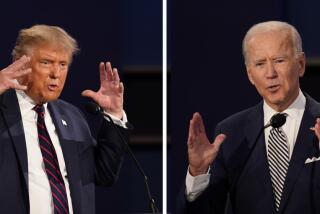Billionaires and generals as the transition takes shape
Donald Trump is now a bit more than three weeks into the most unexpected presidential transition in decades, and a few patterns have emerged:
The president-elect likes to keep people guessing.
He has a fondness for peers from the ranks of the super-wealthy.
And he has gravitated toward Cabinet secretaries who have strongly held views about the agencies they are slated to head.
Good afternoon, I’m David Lauter, Washington bureau chief. Welcome to the Friday edition of our Essential Politics newsletter, in which we look at the events of the week in the presidential transition and highlight some particularly insightful stories.
OPINIONATED PICKS
By and large, Trump’s appointees don’t have experience running big government bureaucracies — retired Gen. James Mattis, his pick to head the Defense Department, stands as the chief exception by virtue of his time as a top military commander. But that doesn’t mean they lack ideas about policy.
Sen. Jeff Sessions of Alabama, Trump’s pick as attorney general, has spent two decades as a lawmaker taking strongly conservative positions on issues of immigration, law enforcement and civil rights. As head of the Justice Department, he could move aggressively to shape immigration enforcement, Brian Bennett reported.
Betsy DeVos, Trump’s choice for secretary of Education, has been one of the country’s leading crusaders for giving parents taxpayer funds to spend on private schools. Rep. Tom Price of Georgia, who is slated to head Health and Human Services, has led efforts to overturn President Obama’s healthcare law.
In each of those domestic policy choices, Trump has gone for the most conservative of options he had. That doesn’t necessarily prove where his policy priorities will land once he takes office, but it does undercut the argument that as a New Yorker who had once contributed heavily to Democrats, Trump would turn out to be more moderate in office than he had been in the campaign.
Trump likes to present himself as unpredictable, and he certainly appears to enjoy the speculation around his major appointments, most notably secretary of State. Little by little, however, his appointments have begun filling in blank spots on the canvas, and the emerging picture so far looks like an administration that will stand further to the right than any the U.S. has seen since at least Ronald Reagan, and perhaps before.
BILLIONAIRES AND GENERALS
Dwight D. Eisenhower’s Cabinet got the nickname of “nine millionaires and a plumber” — the latter referring to Martin P. Durkin, the former head of the plumbers and pipefitters union who served briefly as secretary of Labor. But as Don Lee reported, Trump seems all but certain to go well beyond that, and is heading toward presiding over the wealthiest administration in U.S. history.
The other category of appointees Trump appears to favor are former high-ranking military officials, including both Mattis and retired Gen. Michael Flynn, his choice as national security advisor.
Mattis, a decorated Marine general who is well respected on Capitol Hill, seems likely to win easy confirmation.
First, however, Congress will have to pass legislation to waive the requirement that a military officer be out of uniform for seven years before presiding over the Pentagon. Sen. John McCain of Arizona, an enthusiastic backer of Mattis’, plans to push the waiver through, but some senators are objecting.
On Friday, Sen. Kirsten Gillibrand of New York said she would oppose a waiver. “Civilian control of our military is a fundamental principle of American democracy, and I will not vote for an exception to this rule,” she said in a statement.
Who has Trump’s ear on making those decisions? As Chris Megerian wrote, the circle is small, and one person has more access than any other — Trump’s son-in-law, Jared Kushner.
A LONG LIST OF POLICY QUESTION MARKS
As Cathy Decker wrote, Trump has energetically used Twitter and his mastery of television to create an image of action, even as his administration-in-waiting has put off some hard decisions on policy issues.
One key issue will be how quickly Trump will try to repeal Obamacare. As Noam Levey reported, repeal is a lot harder than it sounds. And as new polling has shown, much of the law is pretty popular.
Another unknown, Evan Halper reported, is how aggressively Trump will try to reverse Obama administration policies on climate change. Still another is whether he will try to scrap the deal that Obama reached with Iran to limit that nation’s nuclear program. As Bennett reported, top U.S. intelligence officials have warned Trump about the risks of doing so.
Then there’s the question of whether the new administration will fight against states that have legalized marijuana. Sessions has strongly opposed federal cooperation with marijuana legalization. Whether Trump will give him latitude to pursue his views will be a carefully watched question in the eight states that have legalized recreational use of pot and the considerably longer list that allow medical use.
A key player in many of those battles will probably be Rep. Xavier Becerra, who is soon to take office as California’s attorney general. Much as Texas officials used the courts to take on Obama administration policies, Becerra will be in position to battle Trump’s appointees on a broad range of issues on which their policies will clash with the state’s values.
STILL LITIGATING THE ELECTION
Meantime, both Trump and some of his opponents seem to find benefit in continuing to fight the last war. The president-elect went to Ohio on Thursday evening for a rally in which he regaled his audience with staples of his campaign and aired grievances against long-time foils, including the media, Hillary Clinton and Ohio’s Republican governor, John Kasich.
At the other end of the ideological spectrum, Jill Stein, the Green Party nominee, has discovered a pot of gold — or at least a very reliable source of email fundraising — in her efforts to get recounts in Wisconsin, Pennsylvania and Michigan.
The Clinton campaign, outside experts and even Stein herself say they do not think the recounts will have any impact on the election results: Clinton will win the popular vote by nearly 3 million votes, while narrowly losing the electoral college.
But the recount will, at minimum, keep lawyers busy. On Friday, Michigan’s attorney general, Bill Schuette, said he would go to court to block a recount in his state.
Finally, Harvard’s Institute of Politics holds a session very four years in which managers of the rival campaigns talk about what they did and why they did it. This year’s version, which took place on Thursday, was among the most contentious ever. Here’s my account of the campaign managers trying to figure out whether anyone could have stopped Trump.
LOGISTICS
That wraps up this week. My colleague Christina Bellantoni will be back Monday with the weekday edition of Essential Politics. Until then, keep track of all the developments with our Trail Guide: Transition to Trump, at our Politics page and on Twitter @latimespolitics and @LATpoliticsCA. And if you like this newsletter, tell your friends to sign up!
Send your comments, suggestions and news tips to politics@latimes.com.
More to Read
Get the L.A. Times Politics newsletter
Deeply reported insights into legislation, politics and policy from Sacramento, Washington and beyond. In your inbox three times per week.
You may occasionally receive promotional content from the Los Angeles Times.







